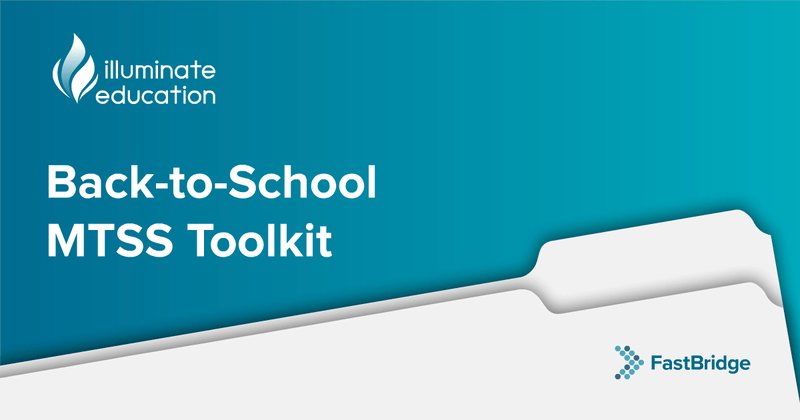By: Dawn Miller, Ph.D.
In the early ’90s I entered into the world we now know as Multi-Tiered System of Supports (MTSS). We didn’t have the full vision and all the structures then, but progress monitoring was always a central practice within the framework. The practice carries a mindset of formatively evaluating our decisions as they relate to improved outcomes for students. It is this notion that what we do matters (and it matters a lot) that makes progress monitoring such a critical component of MTSS. Sometimes we get a good instructional fit right away, and sometimes we are humbled trying to figure it out.
Why Progress Monitoring Needs an Elevator Speech
In my early work with MTSS, I realized that not everyone shared my passion for progress monitoring. I discovered that time spent helping educators understand the why behind the practice was a necessity that needed to precede logistics and expectations. We don’t want progress monitoring to be something you check off a list or something you do “because you were told to do it.” Instead, we need to honor our profession and the amazing weight we carry on our shoulders to ensure that each student who passes through our doors eventually walks across the graduation stage with confidence, pride and a diploma that signifies important academic milestones were met to set them up for success with a wide range of post-secondary options.
This notion of honoring our profession and our work is what led me to think about creating an elevator speech that changes the narrative about progress monitoring. What’s an elevator speech? The time it takes to get from the lobby to the 15th floor is 1.5 minutes. That’s how much time you have to tell someone about progress monitoring.
Having an elevator speech makes us at the ready to convey to someone (1) the context of progress monitoring, (2) the why and (3) an analogy. Let’s unpack each of these and provide the tools for you to compose your own speech suitable for everyone who might need to hear it.
Progress Monitoring: The Context
How would you couch progress monitoring within the context of MTSS? Progress monitoring is a practice that allows for analysis at the district or school level, the grade or department level, among specific groups of students receiving additional support, and at the individual student level when we are individually intensifying support.
The analysis of progress monitoring data allows teams to reflect on the environmental, instructional and curricular factors that are working and not working as well. This pause for reflection, paired with data and allocated time for discussion, is paramount for developing strong, healthy and professional teaching communities of practice. When we can make our thinking overt; our sharing not clouded by fear of judgement; and our decisions based on what we are experiencing, what we know and evidence-based practices, we have just created a powerful recipe recognizing the craft, efficacy and interdependence of our team work.
For your elevator speech, you can mention all, or go right to the context that is most important and relevant for you. Regardless of the level, you’d be talking about the team actively monitoring academic, behavioral and attendance indicators. The monitoring will likely provide an opportunity for timely celebrations, as well as regular opportunities for adjustments during the school year.
Here’s a sentence stem to begin articulating the context in your elevator speech:
Within MTSS, progress plays an important role for _________________________ by ___________________.
Progress Monitoring: The Why
Conveying the why of progress monitoring provides you an opportunity to put into words the contribution it makes. Why is progress monitoring important? I recently worked with an awesome group of educators and we created a digital word cloud from their responses. Their responses were so varied, each with appropriate merit and worth. My personal preference is to provide my own reason why progress monitoring is important paired with the research outcomes associated with the practice.
When it comes to having researched outcomes, we are wildly fortunate (Espin et al., 2012). A body of research extends back several decades demonstrating improved student outcomes associated with progress monitoring broadly, specific benefits related to teachers being more willing to try new ideas in light of data, and research demonstrating less variability in performance (less “bounce around the trendline”) when students are involved in the process.
A more recent body of research that can be particularly powerful to articulate is teacher collective efficacy. Collective efficacy has both components of demonstrating a mindset of being able to have a positive influence on changing outcomes coupled with data to demonstrate improved outcomes.
Here’s a sentence stem to begin articulating the importance of progress monitoring:
I find the importance of progress monitoring to be _________________________ and has impressive evidence from research which has found ______________________ among other findings.
Progress Monitoring: An Analogy
An analogy comes in about the 10th floor. Why an analogy? I think an analogy allows non-educators to make a connection with the practice if everything we’ve said so far sounds too much like “education talk.” My favorite analogy that I’ve heard compares progress monitoring to a GPS. It is amazing that our cars and devices give us visual and auditory prompts and feedback that let us know we are on the best course to our destination. And, our GPS navigator will let us know when we’ve missed a turn and need to re-route. Progress monitoring does the same.
I had the good fortune of working with a gifted first grade teacher, Mrs. Moore, from McPherson, Kansas. When asked what the most powerful practice in MTSS is, she said progress monitoring. Why? Because she feels more confident about her instruction when targeted literacy skills show strong development. When they don’t, progress monitoring gives her early insight into where she needs to personalize instruction.
What analogy works for you? Here is your stem:
Monitoring progress is like __________________ because _______________________.
Put Together Your Elevator Pitch
Combine all of the sentence stems above to create an elevator pitch that builds buy-in for progress monitoring.
Within MTSS, monitoring progress plays an important role for _________________________ by ___________________. I find the importance of progress monitoring to be _________________________ and has impressive evidence from research which has found ______________________ among other findings. Monitoring progress is like ________________ because _______________________.
While you may never actually find yourself in the elevator talking about progress monitoring, I encourage you to look for opportunities that lift our profession and the important work we do as we claim and demonstrate responsibility for each student in our care.
Hear Dr. Dawn Miller talk more about using progress monitoring as an educational GPS in her webinar with FastBridge Learning®.
References
Espin, C., McMater, K.L., Wayman, M.M., & Rose, S. (2012). A measure of success: The influence of curriculum-based measurement in education. Minneapolis: U of Minnesota Press.
Hattie, (June, 2019). Retrieved from https://us.corwin.com/sites/default/files/250_influences_chart_june_2019.pdf



![[eBook] Get the Whole Picture: Using Social, Emotional and Behavioral Assessments to Support Student Success](https://5196620.fs1.hubspotusercontent-na1.net/hubfs/5196620/AdobeStock_157265506.jpeg)




